#and this especially affects me on a trans scale - where trans can never be defined as 'natural' so long as natural means cis (and het too)
Text
The obsession with "natural = good" isn't truly rooted in what is "natural" but is rooted in complex politics based on what is deemed "natural" by others - those in power. The whole "natural is pure, is right, is morally just" has not historically applied to the marginalized because of our supposed proximity to the "unnatural." Our bodies, our behaviour, our lives and souls will continuously be defined as "unnatural" so long as "natural" remains seen as pure and godly, so long as "natural" is equal to power.
#politics#genuinely don't know what to tag this as lol#definitely have talked about this before but. shit like this continues to affect me and others y'know?#and this especially affects me on a trans scale - where trans can never be defined as 'natural' so long as natural means cis (and het too)#natural/human nature politics also has strong roots in christianity too but i don't think that aspect is *necessary*#but it does affect how people are defined if they are in a culture which values christianity i've noticed#shit that's part of the reason my medical transition was delayed and threatened because it was 'unnatural' and a 'privilege' i must 'earn'
675 notes
·
View notes
Note
Wait whats the issue with saying tma/tme?
Similar to what happened to AGAB terms, people have started to use TMA/TME to just mean 'Binary AMAB trans woman/binary AFAB trans man' occasionally parcelling it out to nonbinary people as well based strictly on your AGAB/SAB or perceived AGAB/SAB. The creation of a new binary isn't a good thing, especially one defined by a specific type of oppression/bigotry that is not black and white in it's real life execution. It will always involve ignoring, excluding and erasing the experiences of those who don't fit that strict binary but still experience what it's talking about.
AMAB trans women are the most effected by systemic transmisogyny (after all they are the intended target of it). They are the most affected and the worse affected group. The way others can be affected is not equal but it's also not acceptable and it still happens - circumstantially or otherwise. 'Exempt' means immune to, free from, never experiencing or having to experience X *ever*. Bigots aren't kind and are well known for simply lashing out at anyone with any resemblance to a group they hate.
The line especially gets blurry if one is intersex. An AFAB intersex person, after all, could have gone through a masculinising puberty and be affected by transmisogny for simply looking 'masculine/like a man' in the transphobes eyes. Bigots rarely give a shit about what your personal identity and actual AGAB is. If they want to be transmisogynistic towards you, they will. In this way you will not be 'exempt' simply for not being an AMAB trans woman. There are people who will *never* experience even a lick of transmisogny but it's not strictly based on one's AGAB or gender.
Considering point 1 and how many people use TMA/TME alone to describe someone's identity e.g. 'TMA so-and-so' ...don't you think it's a bit weird referring to trans women specifically by the oppression they face? Not as women, or trans women, or trans femmes but basically 'victim of transmisogny'. It's like referring to your ssa friend as 'lesbophobia affected' instead of 'a lesbian'. It's just strange to centre the persons oppression and not their gender/actual identity to me I dunno. Trans women deserve better than to be constantly reminded or told of their inherent 'inescapable victimhood' to the point where it becomes how they're identified as trans women.
People are using it to basically assess whether a person is or isn't allowed to talk about how transmisogyny or transphobia in general affects anyone of any group. Again this is needlessly exclusionary. Reminds me of how 'no uterus no opinion' was/is used with the intention of telling cis men to back off discussion of cis women's reproductive rights etc but also excludes trans men by assuming their lack of a uterus based on gender and excludes trans women from talking about issues affecting people of their gender simply due to assumedly not having a certain body part.
I don't think people who use it often consider the wider implications and you aren't bad necessarily just for using it. I'm sure some do find it useful, but it's not useful on a wider scale. If it's useful to you then use it for you but maybe we can back off using it for others based on assumptions?
There's many areas of grey when it comes to how transmisogny affects people. People who aren't trans women saying they are affected by transmisogny isn't because they all want to be victims so bad or talk over trans women. It's because they know what they experienced and they don't want to be shoved into another binary box and have their experiences silenced because a bunch of strangers online have black and white thinking. This has never nor will it ever be a good thing to do to someone.
Do I think I've ever been personally affected by transmisogny? No. But that doesn't mean that other trans masc NB people haven't and never will or can. Trans women and trans femmes, especially AMAB ones are always always ALWAYS going to be the most affected and the most vulnerable to it and the ones who have the most to gain from it being fought but that does not and will not ever mean that everyone else is miraculously never affected at all i.e. exempt. That's my personal issue with the TMA/TME dictonomy.
#transmisogny#trans#trans*#transgender#exorsexism#intersexism#also not to do with you specifically anon but I thought after the last hate one I'd turned anon off oops I didn't but I will now#long post
7 notes
·
View notes
Text
Natalie Wynn's "J.K. Rowling" and Disruptive use of Women's Rhetorical Tropes: A Defiant Reply to Transmisogyny
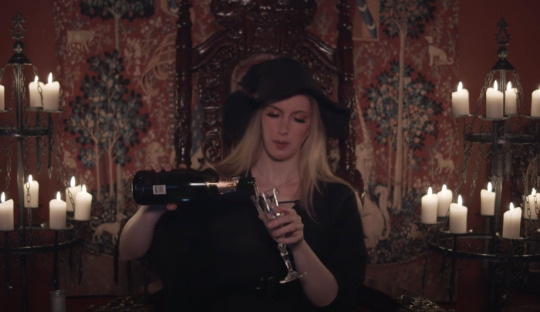
ContraPoints, surrounded by an opulent, candle-lit set and adorned in witch's garb, leisurely pours champagne into her glass — she's ready to breach the internet's hottest topic of January, 2021: her childhood idol being outed as a transphobe (link here). The video itself being over an hour and a half long, I would be hard-pressed to claim that I could ever hope to cover its entirety, comprehensively, in a single post. So to save-face, I'll be dedicating this space only to breaking down her most frequently used rhetorical tropes, one by one.
Irreverence
"Joanne, I wanna talk to you, Joanne! [Fans herself with a rainbow paper fan with the word "BIOLOGICAL" written across it] What is it about Joannes? I can't catch a break from these people" (00:23-00:29, emphasis added).
Wynn's introductory lines immediately open a dialogue with J.K. Rowling — however, this invitation of discourse is defiantly "irreverent" (reminiscent of Nomy Lamm's punk-feminist style in "It’s a Big Fat Revolution” (1995)). Contrapoints, herself a transgender woman, is aware that her very existence is considered in opposition to the TERF-ideology that Rowling subscribes to. Thus, she's rather playful — even openly disrespectful — with her diction: calling the British author by her first name in a mocking-tone and flaunting her own trans identity to the camera (in a way that would likely offend the fragile sensibilities of a transphobe). Her personal tone (with ample use of the pronoun "I") servers a duplicitous purpose: a simultaneous message of "sit down and listen" and a fair degree of "I don't care if you can't accept me."
"So, now that 2020 is finally over, I think we can let the record conclusively show that it was a year whomst is bad. And on top of everything else going on, truly the last thing we needed was the author of Harry Potter coming forward to announce there's two things she can't stand: bigotry, and the transgenders. (00:31 - 00:50, emphasis added).
Finally broaching the subject at hand directly, Wynn employs kairos alongside her irreverence. Kairos, or the rhetorical use of an "opportune moment," holds incredible weight in the first month after 2020: the year in which the whole world fell into a stasis. Characterizing Rowling's transphobia as a collective "the last thing we needed," is also rather dismissive — she unites herself with her audience with the pronoun "we" and invites us all to groan at the exasperating nature of Rowling's bigotry.

Claiming the Right to Speak / Personal Experience
"This is a painful topic for me all around because, as a transgender woman, I am honestly really hurt by a lot of the things Joanne has said in the last year. But I also know what it's like to be the target of a Twitter mob" (01:36-01:47).
As she begins to touch on the topic, Natalie Wynn claims the right to speak on the issue of Rowling's transphobia — a type of bigotry that directly effects her. However, Wynn also situates herself partially with Rowling in her acknowledgement that receiving Twitter backlash is a terrifying experience (an experience, she argues, that the human brain is not prepared to handle the scale of, 01:49-02:39). In treating her subject with such dignity — and adding her own deeply personal account— ContraPoints creates a credible ethos in the beginning of her video essay. The audience is inclined to listen to someone who has been directly effected by the subject of Rowling's controversy (transphobia) and someone who is, rather compassionately, willing to empathize with those who would wish her harm. Although the generally sassy, glamorous, and irreverent tone of the video still appears soon after (see: the above image), her opening up for this somber moment garners a fair degree pathos in the viewer — we, as human beings, are inclined to sympathize with people who are open about being hurt.
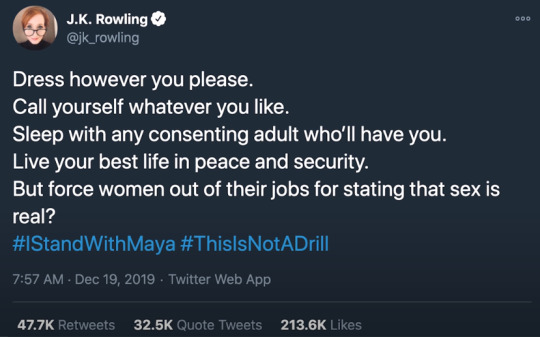
Metis (Embodied Rhetoric)
[The following ContraPoints quote is addressing the above J.K. Rowling tweet, content warning for transmisogyny]
"Transphobes love to play this game where they pretend that trans people just don't understand basic biology, that's our problem! As if I didn't start taking female hormones because I'm acutely aware that my body is not the same as a cis woman's body, that sex is real.
"[Fictional TERF character] You will never be a woman, Nathan. Every cell in your body is male and has a Y chromosome."
Really? That's crazy. How you'd you learn so much about science? You know I don't really feel the need to have a second X chromosome, I get by with only one, I make it work. I actually like the Y chromosome, I think it's a little more dainty, you know, it's little softer, a little more petite. The X chromosome has a lot of extra appendages, and don't you think? I don't need anymore of those, thanks. No trans person thinks it's possible to change chromosomal sex and to pretend otherwise is to argue in bad faith" (08:47-09:34).
If you can excuse my gargantuan quote, I hope you'll agree that the dialogue ContraPoints builds here was just too good to cut short. Within this excerpt, we see Wynn's use of irreverance and personal experience blended seamlessly together. For this YouTuber, the personal is perpetually political — especially when her own identity is constantly taken as an ideological stance. She uses her own expertise in trans issues to pick apart just how disingenuous Rowling's assertions are — even accusing her of "argue[ing] in bad faith" with her reductive claims (later, taking specific issue with how Rowling treats trans-ness as a costume). But, here, she also directly invokes another rhetorical trope: that of metis, or embodied rhetoric. Natalie Wynn specifically references her transgender body as a sort of counterpoint to the condescending "sex is real" claims by TERFs. She cites her intrinsic desire to pursue hormonal therapy as evidence that she — and other trans people like her — are all "acutely aware" that there are chromosomal differences between themselves and cis women.
With this salient statement, she then follows with some humor: which, again, utilizes her trans body in her rhetoric. Her characterization of the Y chromosome as "more petite" and playful declaration of not needing "extra appendages" lightens up the often dark tone that arguing for trans rights and liberation can take. The clever points she makes are by no means weakened by her humor — if anything, the audience is more willing to listen to someone who can "joke about themselves" (so to speak) while still arguing an incredibly important message.
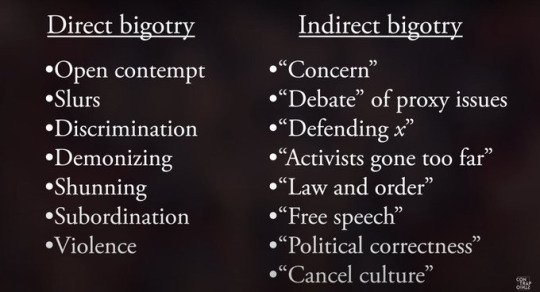
Naming and Defining Issues
"When I see Joanne tweeting about how trans people think sex isn't real and they're erasing same-sex attraction and they're silencing women, alarm bells are ringing because I recognize these as familiar transphobic talking points, specifically TERF talking points. "TERF" means trans exclusionary radical feminism. God are we still talking about this? I promise this is the last time. So TERFism is a hate movement that disguises transphobia as feminism. ... The fundamental problem with TERFs is not that they're mean. It's that they're politically reactionary, they want to reverse the progress of trans liberation." (14:05-16:02)
In her definition of TERF rhetoric, Natalie Wynn outlines some dog-whistles that are obvious to her, as a trans woman. She calmly explains to the viewer that, oftentimes in the present-day, rhetorics of exclusion are thoroughly disguised; TERFs, specifically, hide their rampant transphobia as a form of feminism. However, she further clarifies that the specific "danger" that TERFs pose is not from their cruelty — it's from their fervent dedication to strip away trans rights through political means. By specifying this danger, Natalie Wynn shifts the conversation away from empty discussion of offensiveness/terminology, to issues which directly affect the lives of trans people every day.
[This portion addresses the picture above]
Also an act of naming and defining, ContraPoints makes a distinction between "Direct" and "Indirect Bigotry." She argues that many people envision bigotry as a festering, public, frothing-at-the-mouth hatred — a phenomenon she dubs "the Westboro Baptist Church theory of bigotry" (20:06). In bringing attention to the human tendency to think of people as exclusively practicing "direct bigotry" — envisioning them as a sort of delusional "other" — she then forces the audience to contemplate the relative omni-presence of the more covert (and possibly alluring) "indirect bigotry." This definition, crucially, requires introspection. By allowing ourselves to think of bigots not exclusively as "Westboros," we're made to adopt a much more nuanced view of subjects (most) generally prefer to keep black-and-white. Natalie Wynn uses her J.K. Rowling case study to complicate this 2D view of "The Bigot," inviting others to more carefully examine how politically reactionary views develop.
Phew, this was probably the longest post I've ever typed up on tumblr! Hopefully, I succeeded in demystifying (or at least adding clarity to) some of the specific tropes ContraPoints uses (that are common to women's rhetorics as a whole). Thanks for reading if you stuck around this long, and my ask box is always open!
22 notes
·
View notes
Text
Genderbending Robin Hood Adventure Marian Flies True
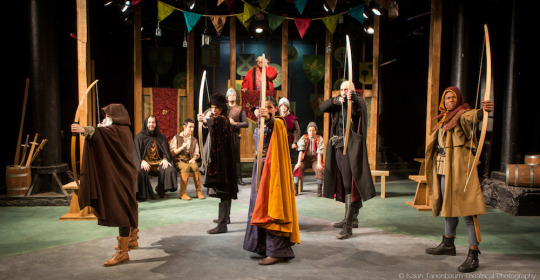
While Robin Hood tales have run the gamut from swashbuckling adventure to serious romantic drama to winking parody to dancing foxes, a few constants remain as true as Robin’s shaft-splitting arrow: Robin Hood, master of both archery and disguise, leads his band of Merry Men to rob from the rich and give to the poor. But what if the real treasure that Robin loots from the privileged (that is, men) is opportunity and agency for everyone else (women and gender-nonconforming people)?
Oh, and Robin Hood was Maid Marian the entire time. It’s the kind of delightful twist that could have been the climax of another tale, but playwright Adam Szymkowicz makes it nearly the opening line of Marian, or the True Tale of Robin Hood. And suddenly, just like the anthropomorphic residents of Disney’s Sherwood Forest or the bellowing refrains of “Men in Tights” from Mel Brooks, a new lens is put into place, through which to reevaluate the familiar trappings of this archetypal tale.
Not that Flux Theatre Ensemble’s charming production disregards those familiar trappings: Will Lowry’s set places the audience in the middle of the action as if they had wandered into a Renaissance faire or made a reservation at Medieval Times; the pennants extending into the intimate seating at the New Ohio Theatre has a positively transporting effect. With Lowry having set the stage, Kelly O’Donnell’s excellent direction populates it with the players, their revolving door of entrances and exits the stuff of French farce.
Truth be told, the Robin Hood story is pretty formulaic: rob from the rich and give to the poor, win the archery contest, free the girl, humiliate Prince John. However, Marian brings new dimension to these beats: When lady archer Alanna Dale (Jessica Angleskahn) discovers Robin’s (Becky Byers) true identity as Marian, the rogue invites the lady to stuff her hair under a hat, dress in men’s clothes, and join the Merry Men hiding out in Sherwood Forest… where she promptly falls in love with Will Scarlett (T. Thompson) somewhere between their first sparring and first sentry shift.
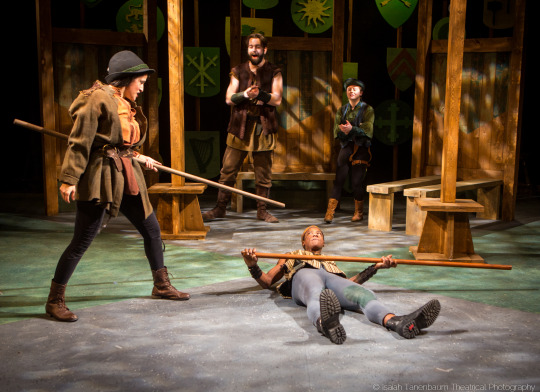
Alanna’s initiation into the Merry Men is the tipping point to reveal that most of the Merry Men aren’t actually men, and that there are more than a few arrow-crossed lovers in the ranks. Maid Marian’s capture later in the play is almost secondary to all of the romantic dramas and identity conflicts unfolding; even the guards have affairs! With all of these secretive trysts and constant donning and doffing of disguises, Marian is less Robin Hood retelling than medieval sex farce, with couples snatching brief tête-à-têtes, on constant alert for a guard or Prince John or another Merry Man to walk in on them.
Which is not to say that makeouts are the only action: Marian boasts a number of balletic fight scenes (choreographed by Rocío Mendez) that highlight the bulk or grace of the respective fighters. In addition to these personal touches, there are some truly creative choices with regard to perspective, especially one sequence that involves scaling the castle wall. And I gasped every time an arrow came out of nowhere—that little detail really made me feel as if I were in a Robin Hood adventure.
An amusing aspect that this version retains is the famous romance between Robin and Marian, made even more hilarious by the fact that this “power couple” can never actually be seen in the same room together. Now that’s the kind of Noises Off shenanigans it would have been great to see. Though it’s worth pointing out that the double-casting of Mike Mihm as both Friar Tuck and the Sheriff of Nottingham achieves some of that winking humor: Both are lovers to lady-in-waiting Shirley (Nandita Shenoy), though it’s clear that she’s more smitten with the good Friar. The latter’s pillow talk is one of the play’s surprisingly deep moments, as they discuss the relative sinfulness of greed when it’s not coveting someone else’s possessions but simply wanting better for your own life.
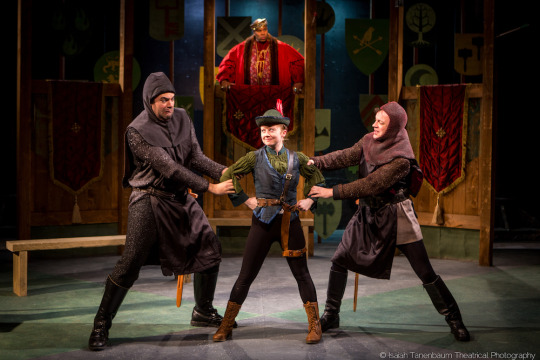
It’s the kind of existential dilemma that Marian could weigh in on, but strangely, we never find out the why behind this genderbending plot twist: Did Marian dream up the Robin Hood persona, or was it bequeathed upon her, à la the Dread Pirate Roberts? How does she account for feminine inconveniences such as her period or the need for hair upkeep? Surely the Merry Men would notice if there were soiled sanitary napkins piling up around camp every month, or extra hairpins and chest bindings lying around. Did she decide to lead a double life because of shortcomings in her life as Marian; if so, why live half of her time as a noblewoman courting Prince John’s affections? Access, most likely, though we only get to see the tail end of one heist that she’s masterminded.
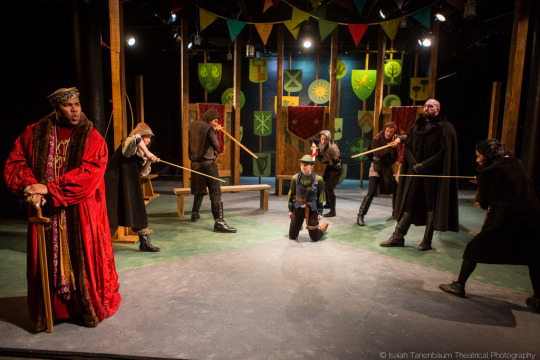
Perhaps my favorite facet of Marian’s character is her reverse-psychology utilization of “feminine wiles”: Whenever Prince John starts getting too handsy, she starts sweetly talking about her period, which has him twisting in revulsion even before she’s gotten into the nitty-gritty. All she has to do is remind this germaphobe prince about the not-so-fun parts of her genitals, and he’s lost any boner. As Prince John, Kevin R. Free is an absolute delight. Yes, he embodies the bumbling ruler through campy sashays and ridiculous cooing to a fake carrier pigeon. But for every shrill order there’s the converse, as he shifts into menacing by dropping an octave and pulling himself up to his full height, reminding you—oh shit, this is the man in charge, we’re in trouble.
Our own lack of access to Marian is somewhat mollified by Alanna frequently stepping outside of the narrative to deliver a running commentary on the action—a framing device that I found at times charming (“I don’t know this yet”) and other times excessive (considering the frequency with which she interrupted the action). As we’ve just learned that Robin isn’t who we thought he was, taking another step away from the archetypal character naturally loses some of the intimacy I was craving. Yet at the same time, it’s wonderful to see that Marian is the rule rather than the exception, to meet other women who possess the same pluck and spine. But Alanna is no mere audience insert; as a(nother!) slyly genderbent take on the minstrel Alan-a-Dale, who pops up in many a classic Robin Hood tale, she ably fulfills the duties of her predecessor.
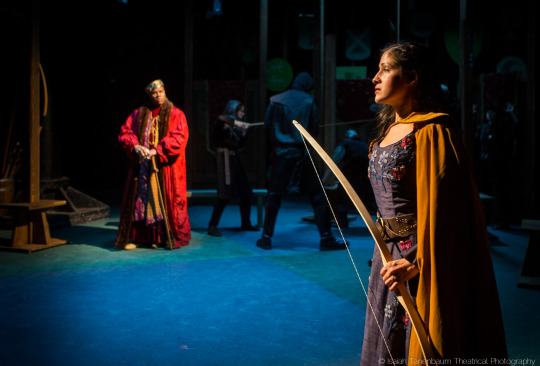
Further, Alanna’s perspective—bookending moments with “This is my [concerned/in love/etc.] face”—taps into one of the play’s central themes: the duality of self. Prince John allows no one but concubines access to him in his most private moments. Shirley has the same “define the relationship” conversation with both of her paramours, down to the word, but the inflection couldn’t be more different. Just as he hides his sensitivity with brashness, Will Scarlett has a very specific persona he wants the world to see, genitals be damned. Little John (played to perfect sweet dumbness by Jack Horton Gilbert) reconciles his crush on Marian with his love and loyalty for his best friend Robin. Alanna knows that the face she turns toward the world is not reflective of what’s going on inside her head.
It’s a credit to Szymkowicz that Marian isn’t the only character struggling with two selves, but Becky Byers embodies that push-and-pull with aplomb. I’ve seen her age ten years in a day (in Mac Rogers’ The Honeycomb Trilogy), so I was delighted by the perfect casting. Though her chipper Robin, dressed in all green, sometimes leans more Peter Pan, further consideration has made me realize that it’s just a new take on the famous Robin Hood aloofness that makes him so inspiring but also so frustrating. Even when he’s giving so much in terms of riches, he gives away little of himself. Unfortunately, Marian is drawn less clearly; she invokes the same cheery deflection with Prince John, but we know little of her private self… except for one telling line, in a moment of somber self-analysis: “Some of us have to have less so all of us can have more.”
What Marian lacks in nuance, she makes up for as Robin Hood the figurehead, granting permission to everyone else to express their truest desires. The casting of mostly female and trans actors in the Merry Men brings to mind Jaclyn Backhaus’ Men On Boats, but in this case, the play explicitly addresses the queering of traditional notions of gender. The most touching example is that of Much the Miller’s Son (C. Bain), who confesses to the rest of the Merry Men that they don’t feel much like a man—or a woman, for that matter. They request that the name of the group be adjusted to account for not just cisgender men or women in drag (though, hilariously, no one actually knows about the women in their midst), and though no one actually understands why Much made this request, they don’t deny it. Bain’s part is small, but he imbues it with such gravity and earnestness that Much’s desires become intensely relatable.

With a 90-minute running time, Marian both moves too quickly in parts and drags in others, as the story seems designed to fit the timing instead of the other way around. We cover so much ground, with an ending that felt far too rushed in its attempts to both achieve closure but keep the myth going, that the overall effect of this particular story is lessened. In truth, Marian would make an amazing pilot of sorts, the first volume in an ongoing saga. I would love to see it live on as an ongoing series, like The Brick’s monthly soap opera It’s Getting Tired, Mildred or The Flea’s weekly #serials. That way, we could take on the role of Robin Hood’s audience night after night and week after week—right where he wants us.
Marian, or the True Tale of Robin Hood runs through Saturday, February 11 at the New Ohio Theatre. Click here to purchase a Living Ticket!
1 note
·
View note